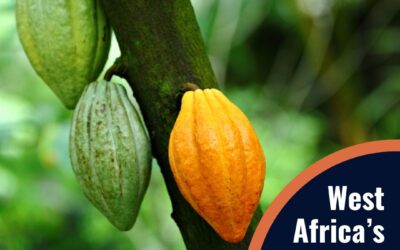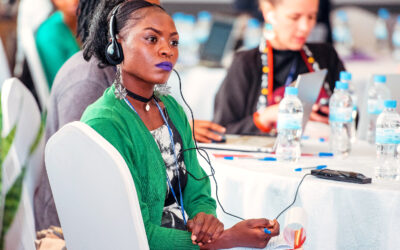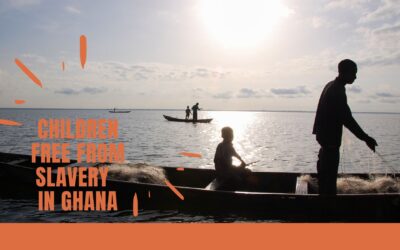FTS frontline work is focused on community organizing, and our partners in Ghana are no strangers to doing it effectively. One technique is to form a “CCPC,” a Child Community Protection Committee. These community watchdog groups protect children from various forms of slavery.
The CCPCs are comprised of community-chosen members, often well-respected local leaders and reflective of the diversity of the community. This approach has been used successfully on a large scale to greatly reduce cases of child labor in the cocoa industry.
On my recent trip to Ghana, I visited several CCPCs along with our partner organization Challenging Heights (started by Freedom Award winner James Kofi Annan). I was thrilled to see what these groups had accomplished in a short time.
One CCPC had particularly amazing stories to share. In the Kyenkyiso community in the coastal town of Senya, committee members (seen in these photos) were waiting anxiously for us to arrive. Among them: the community chief and his advisors, a government assemblyman, and the leader of a local women’s group.
A young girl represented the children of the community. She appeared shy and was silent as we spoke to the adults; but when we asked her what she had been doing in her CCPC role, a huge grin crossed her face. She lit up as she told us about the after-school meetings she led with other children, where they discuss the dangers of being trafficked and how to protect themselves from it.
The CCPC members had gone door-to-door to speak with community members about the importance of keeping their children in school, and advise them how to avoid falling victim to empty promises from traffickers that their children will be cared for if sent away.
This resulted in greatly increased school enrollment rates– so high that one CCPC member had given up a room in her house as a space for the school because they couldn’t fit all the students in the classroom!
 But the most astounding accomplishment of this CCPC was that after receiving a tip-off, several members managed to stop a night bus traveling to Yeji (the town most trafficked children cross through before reaching their destination of enslavement). The CCPC cornered the bus driver, demanding to know why 25 of the 40 passengers on the bus were children ranging from 5 to 12 years old. Not having a good answer, the driver was forced to let the children off. They were taken home and are being closely monitored by the CCPC.
But the most astounding accomplishment of this CCPC was that after receiving a tip-off, several members managed to stop a night bus traveling to Yeji (the town most trafficked children cross through before reaching their destination of enslavement). The CCPC cornered the bus driver, demanding to know why 25 of the 40 passengers on the bus were children ranging from 5 to 12 years old. Not having a good answer, the driver was forced to let the children off. They were taken home and are being closely monitored by the CCPC.
Fortunately, the Kyenkyiso CCPC is just one of many shining examples of the community work that FTS supports around the world.



